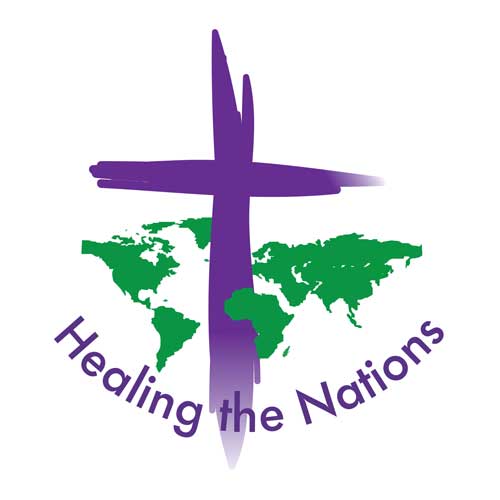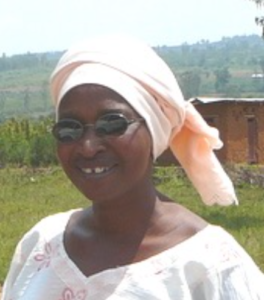Testmonies
Below are 4 extraordinary stories that detail how God is able to take the seemingly impossible and yet redeem it beyond what we could ask or imagine. Take your time to appreciate these testimonies and give thanks to God as you go for His incredible grace and favour.
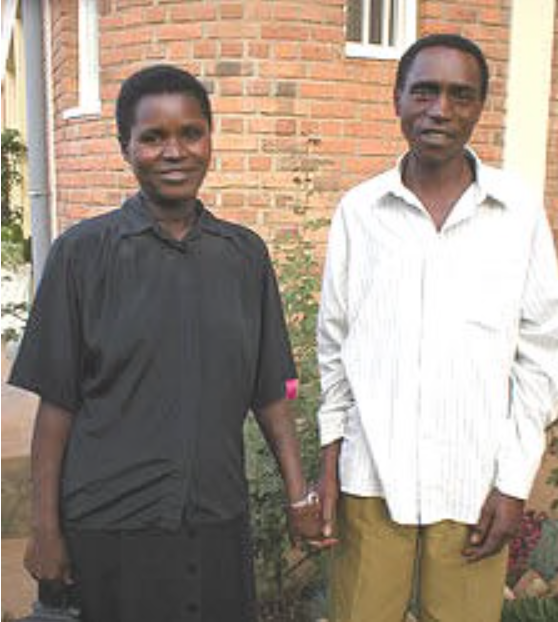 Almost all of Renata’s family had been killed in the genocide. On top of this she had been raped many times and now is HIV positive. She was very traumatised and could trust no-one. Then in 2005 someone invited her to a healing seminar. When she arrived she saw that there were released prisoners there, also, and this was too painful for her so she almost left. But then the teachings began to heal her and she felt the seminar had been designed solely for her. Hearing that Jesus was her Pain Bearer was astounding to her. (She already was a believer.) She cried a lot and gave Him all her sufferings and felt a great release. The next day a prisoner stood and confessed he had killed her family. She was shocked and felt great sorrow. But then she told him he had been very courageous to confess and she walked up to him and hugged him, telling him she forgave him. Since then she has also been able to forgive those who raped her, and says her health is much better since then.
Almost all of Renata’s family had been killed in the genocide. On top of this she had been raped many times and now is HIV positive. She was very traumatised and could trust no-one. Then in 2005 someone invited her to a healing seminar. When she arrived she saw that there were released prisoners there, also, and this was too painful for her so she almost left. But then the teachings began to heal her and she felt the seminar had been designed solely for her. Hearing that Jesus was her Pain Bearer was astounding to her. (She already was a believer.) She cried a lot and gave Him all her sufferings and felt a great release. The next day a prisoner stood and confessed he had killed her family. She was shocked and felt great sorrow. But then she told him he had been very courageous to confess and she walked up to him and hugged him, telling him she forgave him. Since then she has also been able to forgive those who raped her, and says her health is much better since then.
Francois’ story was very different. With head bowed, he related that he had killed many people but had come under a heavy weight of guilt in prison and had confessed. After his release, awaiting trial, he was invited to a seminar. Here he heard what he described as wonderful teachings, especially about the cross. This was new to him, and during the cross workshop he took everything to the cross. For the first time he felt clean and pure. “But the amazing thing,” he said, “was that that the survivor of the family I killed was present and was able to forgive me.” Renata was that survivor. They are now working together in the community visiting both victims and perpetrators to share their testimonies.
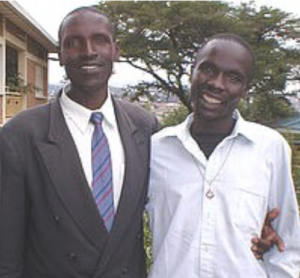 A seminar was held in Ruhengeri (northern Rwanda), with survivors and released prisoners. At the beginning, the survivors were quite bitter and resisted mixing with those from the prison. One of the survivors said that though he wouldn’t harm anyone from prison, in his heart he wished them dead. After the Cross Workshop, Daniel–one of the survivors–forgave and started to be friendly toward the prisoners, but they feared and avoided him. Eventually, however, Daniel was able to bring both groups together and they started helping each other. They came together and cultivated a field for either a survivor or one of the released prisoners. They started contributing money so they could help any of them with a need. This Association has grown to the point that they are putting their money together now to buy livestock for their members! They are now living in peace with one another. Daniel says, “We are alive now. We want to be a river of life flowing out to bless Rwanda.”
A seminar was held in Ruhengeri (northern Rwanda), with survivors and released prisoners. At the beginning, the survivors were quite bitter and resisted mixing with those from the prison. One of the survivors said that though he wouldn’t harm anyone from prison, in his heart he wished them dead. After the Cross Workshop, Daniel–one of the survivors–forgave and started to be friendly toward the prisoners, but they feared and avoided him. Eventually, however, Daniel was able to bring both groups together and they started helping each other. They came together and cultivated a field for either a survivor or one of the released prisoners. They started contributing money so they could help any of them with a need. This Association has grown to the point that they are putting their money together now to buy livestock for their members! They are now living in peace with one another. Daniel says, “We are alive now. We want to be a river of life flowing out to bless Rwanda.”
Reconciliation Village to Village on a Bicycle
Gaston’s parents were killed, his father being brutally hacked to pieces, and he was hunted during the genocide. When the Interahamwe caught him they beat him over the head with a club and threw him into a pit, along with his sister and her son. Somehow, Gaston got out of the pit, but his sister and her son were buried alive. Only Gaston and 1 sister survived from the whole family. Once “peace” returned, Gaston found himself in emotional turmoil. He still lived in the same village and was paralyzed every time he saw any of those who had thrown him into the pit. His heart was troubled and full of fear. Every night he had nightmares about being hunted again. He couldn’t go back to church, because those who had hunted him were also in the church. He was sick with headaches every day and had to go the hospital nearly every week. But the doctor told Gaston, “Your problem is not physical. Go to the church and pray and try to get help there.” When Gaston finally did go back to the church, God started to work in his heart. He joined the choir and the pain started to go away, so he became bolder to face the people in the church. Then he was invited to a healing and reconciliation seminar.
But when he arrived at the seminar he saw Elijah–one of the men who had killed his father-in-law and his sons–immediately Gaston’s headaches and trauma returned. Still, he stuck it out and began to feel blessed and began to open up and on the last day his heart was changed. He hesitated to testify to his healing, because Elijah and the others knew what they had done to his family, so why should he have to tell them? But then Elijah stood and confessed! He didn’t just stand in the gap in a general way for other Hutu, but he confessed that he, himself, had killed. Gaston felt a light shine in his heart. In tears, he went to Elijah to extend forgiveness. Since then Gaston has not needed to return to the hospital because of headaches.
Elijah’s experience in the seminar was quite different. “People were talking about their pain and wounds from being hunted, but I was different – I am one of those who hunted and killed. I didn’t know what to do with that identity. During the seminar I started to offload my burden. I felt accepted by the victims in the seminar – the people I had hunted.”
When Gaston went home and told his wife that Elijah had confessed to killing her father and brothers, his wife struggled, thinking Gaston had forgiven too much. Gaston realized he had taken a large step down the road of forgiveness and had left her behind, so he taught her the principles in the seminar. Still, she struggled, especially with the idea of Elijah visiting their home. Gaston told her, “He has completely changed and is not the man you saw leading the mob that came to kill you and your family.” When Elijah came to their home, she hid in the bedroom, in fear of her life. Then she attended a full seminar. When she returned she excitedly told Gaston, “I got more than what you received in the seminar!” She had completely changed and desired to live in the spirit of reconciliation.
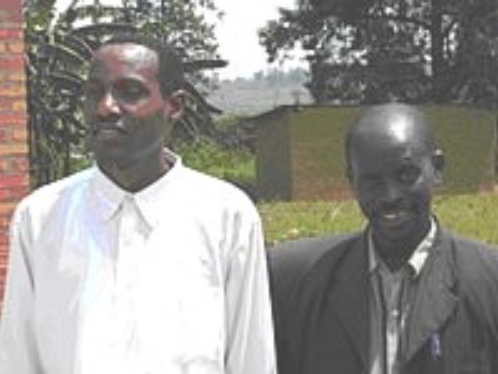 Later, Gaston was appointed the head Gacaca judge at his area’s sector level. He found himself having to judge some of the people who had thrown him into the pit and others who had killed his relatives. Gaston says, “I felt God was sending me there as a test to my healing. Those being tried thought for sure that I would ignore all the rules and just sentence them to the maximum sentence. I even presided as judge over the man who chopped off my father’s legs and arms. Until he confessed to me, I didn’t know who had done it. I asked him how he could have done it and he told me he was horrible. I was still committed to forgive him. He wanted my forgiveness, but still he recognized that I had to carry out justice. The man killed many, many people. He was sentenced, but it was a fair sentence.”
Later, Gaston was appointed the head Gacaca judge at his area’s sector level. He found himself having to judge some of the people who had thrown him into the pit and others who had killed his relatives. Gaston says, “I felt God was sending me there as a test to my healing. Those being tried thought for sure that I would ignore all the rules and just sentence them to the maximum sentence. I even presided as judge over the man who chopped off my father’s legs and arms. Until he confessed to me, I didn’t know who had done it. I asked him how he could have done it and he told me he was horrible. I was still committed to forgive him. He wanted my forgiveness, but still he recognized that I had to carry out justice. The man killed many, many people. He was sentenced, but it was a fair sentence.”
Elijah reports, “It was hard for the community to understand the unity that took place between me and the people I hunted during the genocide. I discovered the power of this message. Gaston and I agreed to come together for a new beginning. When people see us together on a bicycle – one carrying the other, this is enough – it speaks so much.
“We enjoy this unity and want to share it with others. We went to many places in the country together and shared our testimony. Many people were healed. God has called us to this ministry, and we continue to work together. My message is not the seminar, but the fruit that I have experienced from the seminar – I talk about my own story, how I grew up, what I did, how the message has changed me. God has done miracles wherever I have gone.”
Elijah and Gaston have been interviewed together on BBC radio, and have also spoken at a government reconciliation conference where they shared their story with all the top government leaders, including parliament and the president. These days they continue to work together, carrying the message of reconciliation through their testimonies and the principles they learned in the seminar village to village by bicycle. They have also started an Association of ex-killers and neighborhood victims. They build houses for Tutsi victims. Soon Elijah will also start to teach carpentry to the group (a skill he learned in prison).
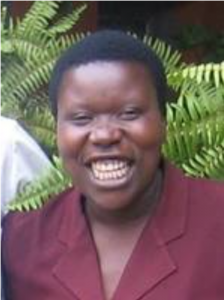 Gaudence in her own words. . .
Gaudence in her own words. . .
“I want to thank God because I got healed from my wounds. In 1994 we fled to Congo and faced many difficulties in the refugee camps. When we came back to Rwanda my father was put in prison. I loved my father, so when he was imprisoned, I was very sad and grieved. I began to hate the Tutsi because they had deprived me of my father. I lived with the hatred and resentment for many years. When I would think of my father in prison I would cry and be filled with anger. But my mom didn’t seem to care. I said “You, woman, are silly. You are stupid. You don’t care at all.” I was trying to contaminate my mother, because I thought we needed to join together in hatred. Since I couldn’t see the hatred in her I began to hate her, too! I was very judgmental. I was even angry with my Tutsi pastor and thought, “Even though they say they are saved, they will perish, and go to hell. All of them!”
“In 1998 I went to a reconciliation workshop with Anastase & Joseph facilitating. In the teaching about roots, I started to realize where I was – I was bitter about my own ethnicity. I also had denominational pride. When it was time for the cross workshop, I realized I had something heavy to give to Jesus. We were told to think about the pain we have experienced and to write the pain down and to give to Jesus. For me the only thing I wrote on the paper was, “I hate Tutsi.” The reason why I hated them is because they took my father to prison. I wrote “I don’t fellowship with other people. I don’t believe in their denomination.” Every time I came back to the memory of my father, I would stop and cry. I gave that to Jesus.
“Then I remembered my mother. I tried to poison her every day so now what could I do about that? When I told her my testimony she was very happy because she didn’t have the same hatred that I had. Now she could expose her own hurt and the pain she had tried to bury. I also encouraged her to express her pain because suppressing it wasn’t helpful. So my mom came to salvation and healing through my witness. She died a few years later, but she was saved and healed when she died!
“After my mother died we were orphans – my father was still in prison. I had to take care of my 6 younger siblings. It was very hard to be a parent to all these children. I didn’t know how to cultivate the land. I would pray and ask Jesus “What am I going to do with these children?” One day we were invited to a reconciliation team retreat in Byumba. I wasn’t on the list of attendees, but I replaced someone. God had already told me I must go and there was something great waiting for me there. Before going to Byumba, I prophesied about an orphan child that God was about to give parents. Because there were so many of us, I didn’t receive that as a personal prophesy.
“In our small group I shared my pain, and said to the other two men, I want to be in the ministry, but if I do it, there will be no one to help with my siblings. So the pastor from Kibungo (a Tutsi) prayed for me. I heard God telling me, “I bought you here because I want to give you a father. This man from Kibungo (Mugasa) is your father now!” I didn’t dare speak it out because I was too young and these men were older pastors. Later in the big group, Phineas prayed “Someone here has a message but is hiding it.” Then Phineas came to me and said “You! You are hiding a message God has given you.” So I said “God said Mugasa is to be my father!” Mugasa came over and hugged me.
I went to Kibungo to visit, and it was a surprise for him. My mother loved me a lot before she died. When I went to Kibungo, Mugasa’s wife received me like a mom. They welcomed me so well into their Tutsi family, and really wanted me to feel like their child. Since then, they are family to me and display so much kindness. They love me like their own child. When ever Mugasa comes to Gikongoro he visits me and gives me so much advice. “My family – my siblings – have been blessed through my experience. As a wounded person I could have poured all my bitterness into the children, if I hadn’t been healed. I always tell my siblings “you should praise the Lord that I have been healed, because I can hear you, value you, and give you love. Please thank the Lord for this because otherwise I could be very bad parent for you!”
“World Vision has a sponsorship program to help children who are raising children. I am now the head of 79 households headed by children. I give the seminar teaching there, and help these other children raise their siblings. I am so grateful to God that I’ve been through this experience. My desire is to see every Rwandan to go through the same experience. I want to say thank you for this ministry. God bless you!
“Recently, my father has been sentenced by the Gacaca court to 30 years. I wanted to help my father, teaching him the things I have learned, help him acknowledge his sin and confess, but he refused. The evidence is against him. He did what he is accused of. If he would have confessed it, the sentence would have been reduced, but he wouldn’t be honest. I still love him but my friends are helping me see that his confession isn’t my responsibility.”
Odette in her own words. . .
“I was living in sorrow and pain for many years. Looking at the killing and genocide in this area, my pain became even worse. After the genocide I was isolated. I became menally dysfunctional. I had lost my husband and children. My parents were killed in a very cruel way, also my husband and children. My first born was buried alive. I couldn’t function anymore.
“When Rhiannon first came after the genocide, the church sent me to the seminar. When she talked about letting ourselves cry, it was something new. I couldn’t cry then, because my head and heart were so heavy with many terrible memories. At a second seminar, I went into a small group, but I couldn’t talk. I attended many different seminars, for 4 years, but, still, I couldn’t talk. Because most of the people in the seminar were Hutu from Gisenyi and Ruhengeri, I couldn’t speak.
“But one day, God really blessed me with a lot of tears. At the next seminar, I exploded into tears during the teaching about the Holy Nation, and at the King’s Table. A pastor from Ruhengeri gave me the bread and wine. I was crying. Then Joseph (a Hutu) crowned me. That opened my heart to the Hutu from these areas and I wept and wept. I started to walk into my healing. Since then I could start sharing my story and receive love in my heart.
“I started to share with other people. I could have a new love for those regions that I had hated so much. (People from these regions killed my husband and children). I could sleep for the first time in many years. I became genuine in my evangelism and ministry for the Lord.
“I was invited to the training for a reconciliation team. When the team formed, I became good friends with Aimable, and he is a good friend of my church. Before, our different churches would be a barrier to our friendship, but now we work together, bringing genocide survivors and released prisoners together. People thought we were such a strange combination. But after each seminar we ran there was unity between the participants. Seeing a genocide survivor hugging a killer gives me strength. The cross workshop has given me strength. I preach about it wherever I go. I was changed through the seminars. We have run 12 seminars with 30-40 people at each one.
“Then I started feeling strongly about widows. We brought together 60 women, most of whom had been raped and infected with aids. Most had lost all their children. Their stories were very difficult to hear. Rape is not something you share with other people. You don’t talk about it. After the seminar, we decided to keep meeting, and have now formed an association. We meet twice a month, praying together and exchanging stories and testimonies and needs. There is trust among us. There were some who couldn’t talk, but this has given them a platform to share. Some were not interested in life anymore, not taking care of themselves, not even washing themselves. But today you see them clean and with a desire to live. Other raped women are now coming to us to be able to share their stories here. Every time we meet we are building hope.
“This year our focus is on improving our welfare. Some have adopted orphans to help. Some are stuck in their houses, unable to leave. We are doing advocacy work with the government and another NGO. Our dream is to become a “medication”– an answer to many widows who are hurting. We were given a study Bible with focus on widows and this is a very good tool. Now we are looking at teaching how to make baskets. We need prayers for the Lord’s provision to break out of our poverty and dependency.”
